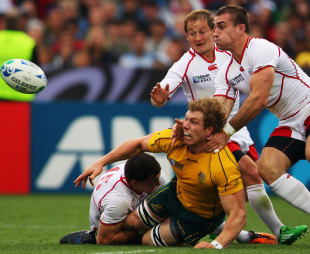|
Rugby World Cup 2011
Communication is key
Rowly Williams
October 13, 2011

Australia's David Pocock said the main focus was to play and listen to the referee highlighting the savvy modern player
© Getty Images
Enlarge
So the quarter-finals are out of the way at Rugby World Cup 2011 and the last four teams standing will compete for the final slots. I'm feeling pretty pleased as someone who got three out of four correct (I'm not going to share who I got wrong), but suffice to say the semi-finals there will be tremendous battles all over the pitch. Alain Rolland and Craig Joubert have got the nod, with Rolland on Six Nations duty, as it were, and Joubert a Tri-Nations clash. So with all four teams knowing pretty much all there is to know about each other, where will the edge come from and who will get their plan right? From day one, the mantra about 'play smart, work with the referees' has never been far from our series of articles, and if it was true then it will remain so right up to October 23 and the World Cup final. The teams and players who do this will prosper, that's not a revelation but common sense. Aussie flanker David Pocock said as much in an interview this week ahead of the clash with New Zealand. Highlighting his role as an open-side, he felt it was getting to the breakdowns first and then hustle for turnovers. "That's the main focus, then listen to what the referee is saying". So in the heat of a rugby battle, duelling with his opposite number and at the sort of pace only International sport can produce, here is a player saying that one of his objectives is to listen to what the referee is saying. Wow, can we have that attitude from 29 others please… However rather than credit such an approach, the default, depending on which article you've read or interview you've listened to, has been to suggest he must have 'cheated' or been allowed to 'cheat'. Thus his outstanding stat of 26 tackles and contribution to nine turnovers has been overlooked. Of course none of this is news to back-row players in general, and openside flankers in particular. Pocock joins a list of players who has now achieved begrudging but genuine respect from his peers and those who know the game well. But what of the, 'or been allowed to cheat' claim? Here the inference is not about integrity but of what a referee allowed, or did not allow. Think back to Pocock's comment earlier, 'getting there first, hustling, then listening to what the referee says'. So from Pocock's point of view if he doesn't hear instructions such as, 'Roll away, or take your hands off, leave the ball alone…', his rule of thumb is to carry on until penalised (or he achieves his aim). I have mentioned before that some referee's penalise early to set out their stall to let the players know what is and isn't acceptable. Others have 'coached' players with some instructions and if they comply, allow play to continue, with smarter players then adapting and playing to that particular referee's style. www.therefzone.co.uk © ESPN Sports Media Ltd.
|
Live Sports
Communication error please reload the page.
-
Football
-
Cricket
-
Rugby
-
- Days
- Hrs
- Mins
- Secs
F1 - Abu Dhabi GP
Abu Dhabi Grand Prix December 11-131. Max Verstappen ()
2. Valtteri Bottas (Mercedes)
3. Lewis Hamilton (Mercedes)
4. Alexander Albon ()
5. Lando Norris ()
6. Carlos Sainz Jr ()
-
ESPNOtherLive >>
Golf - Houston Open
Snooker - China Open
Tennis - Miami Open

